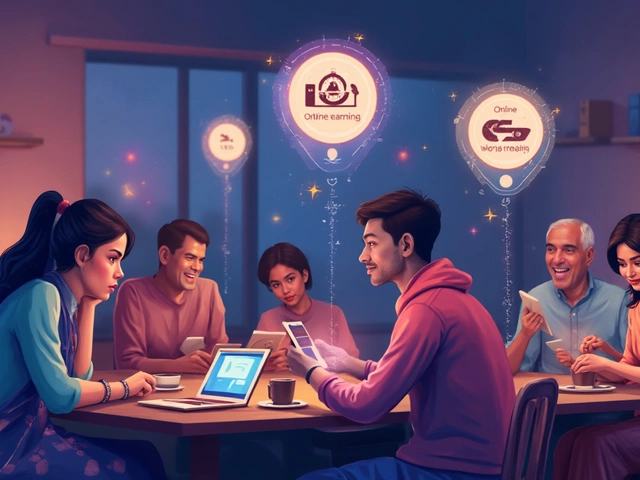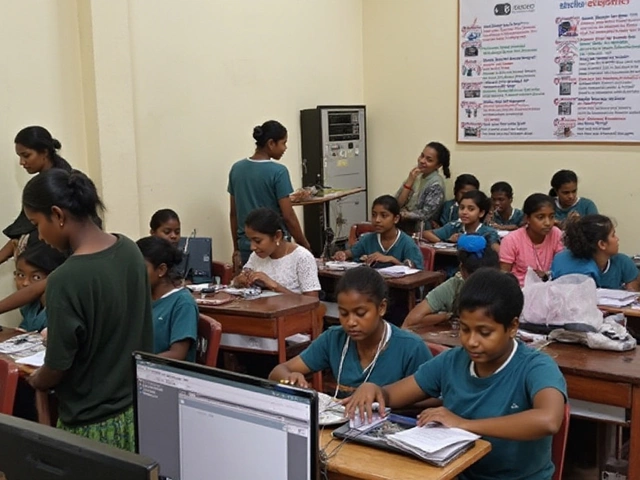
Feeling lost about which exam to tackle after graduation? You’re definitely not alone. Every year, lakhs of fresh graduates in India stare at the same huge list of options—banking, civil services, SSC, teaching, even going abroad. The pressure’s real. One wrong turn and you’re stuck prepping for something you’re not excited about—or worse, something that doesn’t suit you at all.
The thing is, each exam opens a different door. UPSC leads you toward the power (and paperwork) of the bureaucracy. Banking exams like IBPS or SBI PO set you up for job security and a pretty regular routine. NET and state-level teacher eligibility tests? You could shape young minds or dive into research. There’s no “one size fits all” here.
Getting practical is the only way out. Start by asking yourself: What kind of life do I want? Are you hunting for stability, big money, a work-life balance, or a chance to help society? Your answer can make choosing between SSC CGL and CAT a whole lot simpler. Let’s break down each big category and see what really fits your style and skills. No more confusion. Just clear, honest guidance ahead.
- Why Competitive Exams Matter Post-Graduation
- Top Exams for Government Jobs
- Best Exams for Banking and Finance Careers
- Teaching & Academia: Options Beyond the Mainstream
- Choosing the Right Exam for You: Tips and Real Talk
Why Competitive Exams Matter Post-Graduation
Graduating in India means you suddenly have a ton of choices but not much direction. Competitive exams pop up everywhere as the answer to 'what next?'—and there’s a good reason for that. These exams pretty much decide your future job options, your income, and sometimes even your social status. If you want that government job stability, a shot at banking, or a career teaching in a college, you can’t skip this step.
Over 2 crore people apply for government and banking exams each year. That’s huge—competition is wild, but so are the rewards. This isn’t just about money. For a lot of families, clearing one of these competitive exams is about security, pride, and better work-life balance compared to a private job that demands 12-hour shifts.
| Exam Type | Annual Applicants (Approx.) | Typical Vacancies |
|---|---|---|
| Banking (IBPS/SBI PO) | 1.5 Crore+ | 10,000-35,000 |
| SSC Exams | 50 Lakh+ | 20,000-25,000 |
| UPSC Civil Services | 10 Lakh+ | 800-1,000 |
Getting into these jobs through competitive exams often means better starting pay, clear career progression, and perks like pensions—which you won’t find in most private sector gigs nowadays. Plus, if you want the power to make a difference, nothing beats being in the government or public sector.
But it’s not just about the jobs. Prepping for these exams makes you sharper. You’ll build time management, problem-solving, and clear thinking—skills that help even if you switch lanes later. This is why almost every graduate at least considers giving one major competitive exam, even if they don’t end up taking it. The pay-off can be life-changing.
Top Exams for Government Jobs
Government jobs are the holy grail after graduation—think job security, respect, and solid growth. But here’s the real question: which competitive exams give you the best shot at that dream gig?
Let’s get specific. The biggest heavyweight is the UPSC Civil Services Exam. If you clear it, you can land a spot as an IAS, IPS, or IFS officer. The process isn’t for the faint-hearted: three stages (Prelims, Mains, Interview), a syllabus that reads like a mountain, and tough competition—over 10 lakh people apply every year, but only around a thousand make the cut.
If the national level feels a bit much, staff selection is the next best. The SSC CGL (Staff Selection Commission Combined Graduate Level) exam recruits for positions in ministries and government offices—think Income Tax Inspector or Assistant Section Officer. Lakhs flock to it every year, and the job profiles can be both stable and pretty decent on the pay scale.
Banking is another huge draw. If you want a cushy desk job and a balanced life, go for IBPS PO or SBI PO. The selection process usually has Prelims, Mains, and an interview. The perks? Good salary, medical insurance, leaves you can actually use, and a predictable workday (most of the time!).
- UPSC Civil Services – Dream big, but be ready for a grind. Every detail matters, from current affairs to personality tests.
- SSC CGL – Tons of posts with unique roles. The competition is fierce, but the syllabus won’t drive you nuts.
- Bank PO (IBPS/SBI) – Perfect if you want to skip transfers and enjoy a set routine.
- State PSCs (Public Service Commissions) – These exams are for state-level administration jobs like SDM or Deputy Collector. The pattern is similar to UPSC, but the competition is local, not pan-India.
Check out this quick comparison of key government exams after graduation:
| Exam | Posts Offered | Annual Applicants | Success Rate |
|---|---|---|---|
| UPSC Civil Services | IAS, IPS, IFS, etc. | ~10 lakh | ~0.2% |
| SSC CGL | Inspectors, Assistants, Auditors | ~30 lakh | 1-2% |
| IBPS/SBI PO | Bank Probationary Officers | ~10-15 lakh | 1-3% |
| State PSCs | State Administrative Officers | Varies by state | 0.5-2% |
One tip: Don’t just look at the pay or prestige. Think about work-life balance, work location, and promotion chances too. Sometimes a state government job could suit you better than a glamorous, all-India posting. Whatever you pick, keep your eyes on the application deadlines—most government exams only come around once a year and missing them can set you back months.

Best Exams for Banking and Finance Careers
Banking and finance jobs are popular for a reason: they come with good pay, steady hours, and real chances for promotion. If you’re wondering which competitive exams can launch you into these roles, here’s the inside scoop.
IBPS PO (Institute of Banking Personnel Selection Probationary Officer) is a big one. Every year, lakhs apply for a shot at working with top public sector banks, like PNB or Bank of Baroda. What’s cool is you’re not tied to one bank—the exam opens doors to nearly 11 banks at once. Starting salary? Around ₹52,000 per month after allowances, plus perks like housing and medical coverage.
SBI PO is another beast. It’s tougher than IBPS in some ways because SBI is the biggest name in Indian banking. SBI POs get paid slightly more than their IBPS counterparts, and everyone knows SBI officers climb the ladder pretty fast if they perform well.
Don't ignore RBI Grade B. Cracking this means joining the country’s central bank. If you’re into policy, economics, or finance at the highest level, this is the golden ticket. RBI Grade B officers earn between ₹80,000 and ₹90,000 per month (including perks). But yep, the preparation is intense—you need a mix of strong academics and current affairs know-how.
Here’s a quick comparison of the big exams:
| Exam | Role Offered | Monthly Salary (Approx.) | Selection Steps |
|---|---|---|---|
| IBPS PO | Probationary Officer, Public Sector Banks | ₹52,000 | Prelim, Main, Interview |
| SBI PO | Probationary Officer, SBI | ₹58,000 | Prelim, Main, Interview, Group Exercise |
| RBI Grade B | Officer, Reserve Bank of India | ₹85,000 | Prelim, Main, Interview |
For people interested in insurance, don’t sleep on LIC AAO (Assistant Administrative Officer). LIC is huge; as an AAO, you manage policies, claims, and get a steady government-type work setup.
Here are a few tips if you're eyeing these banking exams:
- Focus on Quant, English, and Reasoning. Bank papers love speed and accuracy.
- Stay updated with the economy—read newspapers like The Hindu or follow RBI’s website.
- Mock tests are a lifesaver. Time yourself. Spot weak spots before the real exam.
- Competitive edge: Some coaching centers give daily current affairs capsules—don’t skip those.
Straight up—banking and finance roles aren’t going away anytime soon. Whether you want the prestige of RBI or the reliability of an IBPS job, these competitive exams give you real choices for career growth and a solid future.
Teaching & Academia: Options Beyond the Mainstream
When folks think about competitive exams after graduation, teaching isn’t always their first pick. Still, it’s packed with serious perks—steady jobs, government support, and a chance to impact lives every single day. Plus, in India, teaching is more than chalk-and-board; it's research, college lecturing, and public sector roles too.
The go-to exam for those hoping to teach at colleges is the UGC NET (National Eligibility Test). Crack this, and you’re eligible for Assistant Professor posts at universities—and you can also bag JRF (Junior Research Fellowship) for research. Many universities won’t even look at your application without it now. Exams are computer-based and held twice a year, usually in June and December. The cool bit? You only need a postgrad degree with 55% marks (50% for reserved categories). Oh, and you don’t have to be locked into one subject—NET covers over 80 subjects, including English, Chemistry, Computer Science, Commerce, and even Music!
- CTET & State TET: Want to teach younger kids? The Central Teacher Eligibility Test (CTET) and various State Teacher Eligibility Tests (TETs) are your gateway to teaching in government and private schools up to class 12. These are essential—schools won’t consider you otherwise.
- CSIR NET: For postgrads in science and tech, CSIR NET is the biggie. Nail this and you’re set for lecturer posts and funded research in top science institutes.
| Exam | Scope | Eligibility | When Held |
|---|---|---|---|
| UGC NET | Assistant Professor, JRF | Postgraduate, 55% marks | Twice a year |
| CTET | School Teacher (Central) | Graduation + B.Ed. | Twice a year |
| CSIR NET | Lecturer, Research Fellow (Science) | MSc/BE/BTech with 55% marks | Twice a year |
Does teaching mean you’re limited to classrooms? Not at all. Passing these exams also opens up opportunities in government research, think tanks, and public policy. You’ll find a stable, respected career option—plus academic hours that can actually improve your work-life balance (handy when you’ve got kids like Mira running around!).
If you’re new to these paths, make sure to check specific subjects and states’ rules. A state TET in Kerala isn’t the same as Maharashtra’s, and eligibility changes all the time. Always go straight to the official exam websites for the updates and don’t fall for coaching center rumors. That little bit of research now can save you months later.

Choosing the Right Exam for You: Tips and Real Talk
Picking the best exam after graduation doesn’t come down to just following trends or copying your friends. There’s no magic quiz for this. But you can make a smarter choice if you match your strengths, goals, and what you actually care about with what the exam leads to.
Start with a reality check. What are you good at? If you hate numbers, banking exams like IBPS PO or SBI PO will probably drive you nuts. But if you love math puzzles, you’ll have an edge. On the flip side, civil service exams (like UPSC or State PSCs) need strong reading, analysis, and writing skills—and a lot of patience for long study hours.
- Government jobs (think UPSC, SSC CGL, State PSC) mainly attract folks looking for long-term stability, respect in society, and a solid set of perks.
- Banking and finance (IBPS, SBI, RBI Grade B) come with a fast-track hiring process and decent pay, but they also mean transfers and a performance-based culture.
- Teaching and research exams (NET, CSIR NET, TET) open doors for those who genuinely enjoy explaining ideas and want job security—with less daily stress once you land the gig.
- If you’re open to private sector or going abroad, exams like CAT, GRE, or GMAT are ticket options to top B-schools or international campuses.
One huge mistake people make is picking an exam simply because “everyone else is doing it.” This is a recipe for burnout. Instead:
- Try practice exams to see which patterns you enjoy or do well in.
- Talk to people in those jobs—the internet is full of honest stories if you dig.
- Look up the cut-off scores and competition ratios, so you know what you’re up against.
Check this quick comparison:
| Exam | 2024 Seats | Applicants (Lakhs) | Success Rate (%) |
|---|---|---|---|
| UPSC CSE | 1,056 | 13.5 | 0.08 |
| SSC CGL | 7,500 | 25 | 0.3 |
| IBPS PO | 4,252 | 8 | 0.5 |
| CAT | Varies | 3.3 | ~2 (IIM calls) |
Numbers show how tough some races get, but don’t let this scare you. Instead, see it as a nudge to play to your strengths and focus hard. If you’re in it just for the job perks, you might not last through months of prep. But if you genuinely like the work, it won’t feel as much of a slog.
My daughter Mira asked me once, “Dad, why didn’t you become an IAS officer?” Truth is, I chose differently because I craved creativity and hated long bureaucracy meetings. If you know your ‘why’, saying no to paths that look shiny from far away becomes way easier.
No matter what, keep your backup options open. If you’re prepping seriously for UPSC, consider parallel applications to SSC or bank exams—it’s common for top scorers to have tried multiple paths before hitting their best fit. The real trick is making sure the competitive exam after graduation you pick actually lines up with who you are and where you want to go next. Trust your gut—and check the facts.





